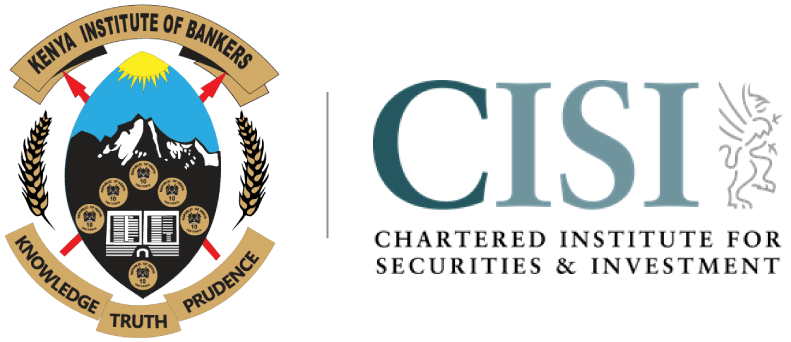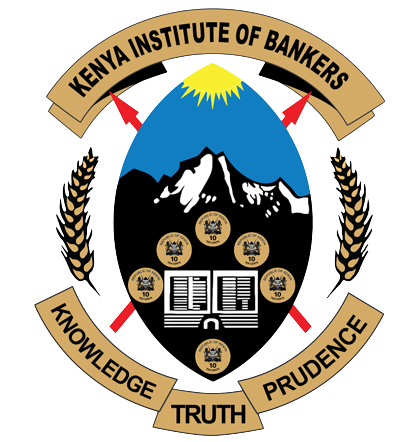


Professionalism. Integrity. Excellence
KIB | CISI Partnership.
The Kenya Institute of Bankers in Partnership with the Chartered Institute for Securities Investment (CISI), have come together to promote professionalism in the financial services sector through well designed and structured programs.
Fundamentals of Credit Risk Management
Fundamentals of
Credit Risk
Management
The qualification provides a solid grounding in the relevant lending principles and products. It also covers a variety of lending sectors, including personal lending, corporate lending and microfinance. The technical lending content is underpinned by consideration of effective lending practice, the importance of credit risk and how lending is influenced by regulation and ethics.
Who should study the qualification?
The broad introduction on this qualification makes it suitable for a range of individuals:
For Financial Services Professionals
This qualification is appropriate for individuals already working in finance and seeking to gain or consolidate their understanding of credit.
Professional new to Credit Risk
This qualification is perfect for those just beginning their careers in financial services.
Firms looking to Increase Skills
Firms wishing to increase their staff’s knowledge in credit management could also use this qualification as part of induction materials.
Key features
- Developed specifically for the Kenyan market with input from stakeholders – awarded by the CBI, delivered in partnership with the CISI in Kenya.
- Prepare for a career in banking – this
qualification provides an in-depth overview of the sector and will help kick start your staff’s careers. - Availability – this exam is available in Kenya on demand via our global network of test centers.
- A fast and affordable recognition – requiring only 100 study hours, the qualification can be achieved in a short time frame and demonstrates commitment to professionalism.
- Access to higher level qualifications – use this qualification as a contributory module to the three modules required for the Professional Banker Diploma.
- Free CISI Student membership – become associated with a globally recognized Chartered professional body. Join over 43,000 members
globally and take advantage of exclusive offers.
Key features
- Thoroughly tackles the financial crime
agenda. - Takes a global view of transnational
crime. - Illustrates practical defenses.
- Incorporates the UK Bribery Act (2010).
- Combine it with a CISI regulatory exam to complete the full Certificate in
Combating Financial Crime. Candidates
are exempt from the regulation paper if they already have a regulatory paper through another route, such as the IOC. - Free CISI student membership – become
associated with a chartered professional
body and take advantage of an extensive range of benefits. - ACSI designatory letters
Combating
Financial
Crime
Combating Financial Crime has been developed by international specialists and focuses on how laws, regulations and best practice continue to evolve across the entire spectrum of associated activities. It covers the background and nature of financial crime, predicate offences , money laundering, terrorist financing, corruption, combating financial crime,
bribery and the role of the private sector.
Who should study Combating Financial Crime?
The scope of the syllabus makes the qualification suitable for compliance officers and money laundering reporting officers, those involved in regulation, law enforcement, trade and commerce and individuals from bi-lateral development institutions and civil society organizations.
Managing
Cyber
Security
The CISI Level 3 Award in Managing Cyber Security, provides candidates with a basic knowledge of the threat of cyber crime. Candidates will be able to evaluate the risks to the financial services profession, and develop effective security solutions to prevent, detect and mitigate cyber attacks.
Who should study the qualification?
The scope of the syllabus makes the qualification suitable for Compliance Officers and Money Laundering Reporting Officers, those involved in regulation, law enforcement, trade and commerce and individuals from bi-lateral development institutions and civil society organizations.
Cyber crime can affect all parts of financial institutions and individuals from various roles will benefit from undertaking this unit.
Designed to complement our Combating Financial Crime qualification.
Candidates who combine this qualification with the IT in Investment Operations will be awarded the CISI Level 3 Certificate in Cyber Security and Information Technology in Investment Operations.
Key features
- Covers all key risks in financial
services – operational, credit,
market, investment and liquidity. - Globally portable – addresses international issues, reflecting the needs of a worldwide market.
- Addresses techniques used to identify, reduce and manage specific aspects of risk.
- Free CISI student membership –
become associated with a chartered professional body and take advantage of an extensive range of benefits. - Flexible study options – can be taken as a stand-alone qualification or combined with other units to achieve the full Certificate in Risk in Financial Services or Investment Operations Certificate (IOC).
- ACSI designatory letters
Risk in
Financial
Services
The Risk in Financial Services qualification is a comprehensive global introduction to the major risk areas in financial services. It provides a sound grounding in the principles of the risk management framework and corporate governance and risk oversight. It covers specific techniques used in identifying, reducing and managing operational risk, credit risk, market risk, investment risk, liquidity risk and model risk.
Who should study Combating Financial Crime?
The Risk in Financial Services qualification is aimed at risk teams, compliance teams, branch management, corporate lawyers, finance officers, senior managers of all disciplines and existing and aspiring non executive directors.
